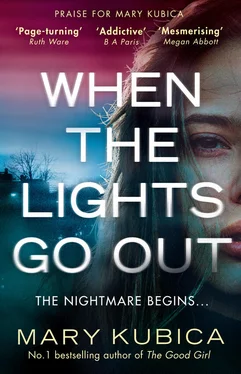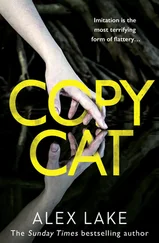You might want to look into that , she’d suggested before ending our call, and I couldn’t help but feel shaken up by it even now, hours later. My name on a death database. Though it’s a mistake, of course.
But still I pray this isn’t some sort of foresight. A prophecy of what’s to come.
I gaze out the window as some woman sits behind the wheel of the Kia, steering us through the streets of Chicago. Her name is Lily and she calls herself an apartment finder . The first I’d heard of Lily was days ago, when I’d come home from a cleaning job—hating the feeling of coming home to Mom’s and my empty house alone, wishing she was there but knowing she would never be again, making a flip decision to sell the home and leave. I came home, leaving my bike on the sidewalk, and there, hanging on the handle of our front door, was an ad for Lily’s efficient and cost-free services. An apartment finder. I’d never heard of such a thing, and yet she was just the thing I needed. The door hanger was in-your-face marketing, the kind I couldn’t recycle with the rest of the junk mail. And so I called Lily and we made an appointment to meet.
Lily’s parallel parking skills are second to none, though it seems easy enough for someone like me who’s never driven a car before. Growing up in an old brick bungalow in Albany Park, there was never a need to drive a car. We didn’t have one. The Brown Line or the bus took us everywhere we needed to go. Either that or our own two feet. I also have my Schwinn, Old Faithful, which is surprisingly resilient in even the worst weather, except for, of course, three feet of snow.
I was fifteen when Mom was diagnosed with cancer, which meant that for the time being, my life was on hold, anything that wasn’t essential set aside. I went to school. I worked. I helped with the mortgage and saved as much as I could. And I held Mom’s hair for her when she puked.
She found the lump herself, slim fingers palpating her own breast because she knew sooner or later this would happen. She didn’t tell me about the lump until after she’d been diagnosed with cancer, one mammogram and a biopsy later. She didn’t want to worry me. They removed the breast first, followed by months of chemotherapy. But it wasn’t long before the cancer returned, in the chest and in the bones this time. The lungs. Back for vengeance.
Jessie, I’m dying. I’m going to die , she had said to me then. We were sitting on the front porch, hand in hand, the day she learned the cancer was back. At that point, her five-year survival rate took a nosedive. She only lived for two more, and none of them great.
The cancer, it’s hereditary. Some aberrant gene that runs through our family line, red pegs lined up in my battleship already. Like Mom and her mom before her, it’s only a matter of time before I too will sink.
I claimed the back seat of the Kia after Lily dropped her purse into the passenger’s chair. She drives with one hand on the horn at all times, so she can scare pedestrians out of the way, those she hollers at from behind safety glass to shake a leg and scoot your boot . I have no credit history and no bank account, which I’ve confessed to Lily, and instead carry a pocketful of cash. Her eyes grew wide when I showed her my money, thirty hundred-dollar bills folded in half and stuck inside a wristlet.
“This might be a problem,” Lily said, shrugging her shoulders not at the cash but rather the shortage of credit, the absence of a bank account, “but we’ll see.”
She suggested I offer a landlord more up front to offset the fact that I’m one of those people who keeps all my money in a fireproof safe box beneath my bed. The checks I earn cleaning houses get cashed at Walmart for a three-dollar service fee, and then deposited into my trusty box. I considered signing on with a temp agency once, but thought better of it. There are perks to my job I won’t find anywhere else. Because I’m cleaning houses, I don’t have to pay taxes to Uncle Sam. I’m an independent contractor. At least that’s the way I’ve always rationalized it in my head, though, for all I know, IRS agents are hot on my heels, planning to nab me for tax evasion.
And still, I load my cleaning supplies into a basket on the back end of Old Faithful each day and pedal off to work, earning as much as two hundred dollars some days by cleaning someone else’s home. I do it in peace with my headphones on. I don’t have to make small talk. No one supervises me. It’s the best job in the world.
“Either that,” said Lily as she easily navigated the streets of Chicago, pulling in to an alley behind a high-rise on Sheridan and putting the car in Park, “or you’ll need to find someone to cosign on the loan,” which isn’t an option for me. I have no one to cosign on the loan.
The apartment search is nearly an abject failure.
Lily shows me apartment after apartment. A third-floor unit in a high-rise in Edgewater. A mid-rise on Ashland, newly rehabbed, in my price range though at the high end of it. Unit after unit of boxlike rooms enclosed by four thin gypsum walls, foggy windows that inhibit the light from coming in. The window screens are torn, one stuffed full with an air-conditioning unit, which is supposed to make me happy because, as Lily points out, renters usually have to buy them themselves, those repulsive window units that bar any natural light from entering the room.
The kitchens are tight. The stoves are old and electric. Freckles of mold grow in the showers’ grout. The closets smell like urine. Lightbulbs have burned out.
But it isn’t the mold or the windows that bother me. It’s the noise and the neighbors—strange people just on the other side of drywall, their domestic life partitioned from mine by a paltry combination of plaster and paper. The sense of claustrophobia that settles under my skin as I pretend to listen to Lily as she goes on and on about the two hundred and eighty square feet in the unit. The laundry facilities. The high-speed internet. But all I hear is the noise of someone’s hair dryer. Women laughing. Men upstairs screaming at a ball game on TV. A phone conversation streaming through the walls. The ding of a microwave, the smell of someone’s lunch.
Four days without sleep. My body is tired, my mind like soup. I lean against the wall, feeling the force of gravity as it threatens to tug my heavy body to the ground.
“What do you think?” Lily asks over the noise of the hair dryer, and I can’t help myself.
“I hate it,” I say, for the eighth or ninth time in a row, one for as many apartments as we’ve seen. Insomnia does that too. It keeps us honest because we don’t have the energy to manufacture a lie.
“How come?” she asks, and I tell her about the hair dryer next door. How it’s loud.
Lily keeps composed, though inside her patience with me must be wearing thin. “Then we keep looking,” she says as I follow her out the door. I’d love to believe that she wants me to be happy, that she wants me to find the perfect place to live. But ultimately it comes down to one thing: my signature on a dotted line. What a lease agreement means for Lily is that an afternoon with me isn’t a complete waste of time.
“I have one more to show you,” she says, promising something different from the last umpteen apartments we’ve seen. We return to the Kia and I buckle up in the back seat, behind the purse that’s already riding shotgun. We drive. Minutes later the car pulls to a sluggish stop before a greystone on Cornelia, gliding easily into a parking spot. The street is residential, lacking completely in communal living structures. No apartments. No condominiums. No high-rises with elevators that overlook crappy convenient marts. No strangers milling around on street corners.
Читать дальше












